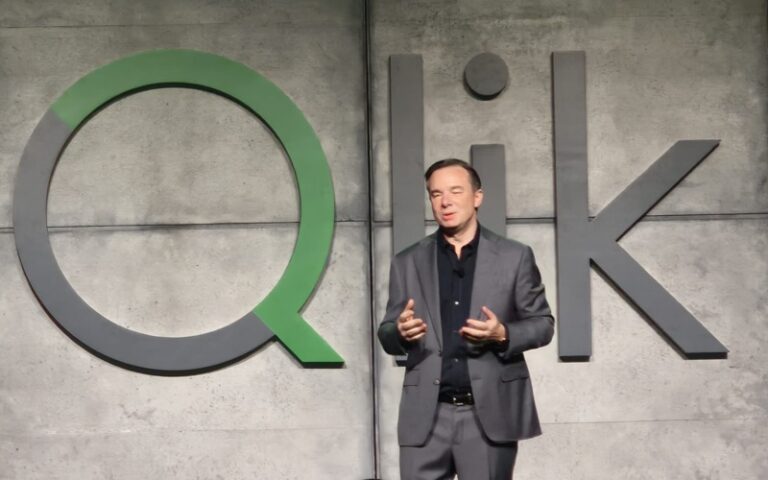Qlik is known for its platform scope that extends across data quality, data analytics and data integration functions. These technologies manifest themselves through data analytics services spanning data modeling controls, data connectivity toolsets, business intelligence-related visualisations and more that work from the point of raw data ingestion through to tactical and strategic business decision making. As the company’s platform now features agentic intelligence functions across its entire stack, how does a data integration and BI specialist become more than the sum of its parts?
Slotting into at least three market segments simultaneously (and with enough internal platform cohesion to provide one centralised technology proposition) Qlik used its Qlik Connect conference this month in Orlando to detail some major announcements and showcase its wider vision for data management – and, crucially, it’s a vision that benefits from agentic AI controls offering natural language queries throughout the entire data stack.
New services in Qlik Cloud Analytics are designed to provide enterprises tools capable of detecting anomalies, forecasting complex trends, preparing data faster and taking immediate action through embedded decision workflows. The company’s new layer of intelligence extends across its platform so that software and data engineers don’t just get a focus on what’s happening immediately, the tools promise to anticipate what’s next and enable action in the moment.
Qlik’s “discovery agent” with multivariate time series forecasting, “write table” and “table recipe” technologies work in concert here to solve a singular problem: how to move from fragmented insight to seamless execution, at scale.
What is multivariate time series technology?
Multivariate (or multi-variate) time series technology is a strain and sub-discipline of data and data analytics that tracks multiple variables over time. This approach opens up an opportunity to look at the analysis of relationships and patterns between variables. Unlike a “univariate time series” analysis (the opposite approach, obviously), which focuses on a single variable, multivariate time series analysis considers the interplay of several variables in order to try and understand complex phenomena. As Science Direct explains, “Multivariate time series refers to a type of data that consists of multiple variables recorded over time, where each variable can have different sampling frequencies, varying numbers of measurements and different periodicities. It is commonly used in various fields such as industrial automation, healthcare systems and simulation studies.”
Qlik says its latest product launches, along with the renaming of Qlik AutoML to Qlik Predict and Qlik Application Automation to Qlik Automate, reflect a broader shift toward more intuitive, outcome-driven experiences across the Qlik platform. “Each capability targets a critical enterprise bottleneck – from delayed awareness to inaccurate forecasting, data prep bottlenecks to disconnected workflows – delivering a cohesive solution that closes the gap between data and decisions,” stated Qlik, in a press statement.
Qlik agentic experience
The company used its event to introduce its new agentic AI experience services. The agentic experience here is designed to provide a single, conversational interface allowing users across the enterprise to interact naturally with data, using specialised AI agents to bring new simplicity to complex data-driven workflows.
At the heart of its data exploration, visualisation and analytics approach, the technology at the centre is the Qlik engine. This is a technology designed to index relationships across data, enabling the discovery of what the company calls “unexpected connections” – and, fundamentally, the agentic experience builds directly on this engine, expanding the ability of both users and agents to intuitively access these relationships.
Speaking at his Orlando keynote, Qlik CEO Mike Capone has said that he talks to other CEOs and CIOs every day about supply chain disruptions and all the difficult (and essentially uncertain) market factors that organisations need to navigate today.
Performance, scale & economics
“As we know, data and AI and the ability to leverage it with trust and execute with confidence is the way to navigate through these challenges,” enthused Capone. “We’re now applying agentic functions across our whole platform – across structured and unstructured data. Our open data lakehouse technology is a breakthrough foundation for scaling AI without runaway costs (so many of the users we talk to say that they had never envisioned how expensive running AI might be), so we’re addressing performance, scale and economics concurrently.”
But why Qlik, asks Capone… what sets the company apart?
Governance is inherent to the platform across all its functions, said the CEO. Its in-memory associative engine has always been the company’s defining technology and that reality actually hasn’t changed. By bringing forward a triumvirate of data integration, data quality and data analytics (and business intelligence) in one platform, Qlik is the only company that magical analyst house Gartner lists across all three of its market quadrants for those sectors.
Bringing in more analyst opinions, Ritu Jyoti of IDC joined Capone on stage to add her comments. Talking about where AI goes next, Jyoti said that while all the AI investment is going on, the maturity of AI in general (on what she says is a five-stage AI maturity cycle) is slow. This is due to what the analyst defines as four core reasons… 1) fragmented data as the norm in most firms 2) AI not being applied in the right use cases with the right KPIs 3) the lack of an AI-ready workforce and 4) the amount of resistance to change that exists in many workplaces with people thinking that AI will take their jobs.
“People are trying to understand generative AI and now agentic is here (which is beyond gen-AI, which was really about augmenting the human in the workplace and making work better), but now that we work with agentic functions, the focus has shifted to agility and the chance to be more dynamic. If we apply agentic functions to a software engineer’s job, you get a developer that is far more adept at areas like function call analysis (for example) so a higher-level coder if you like. It’s all about moving with agility and speed in ways that humans on their own would never have been able to achieve,” said Jyoti.
Do data differently
Qlik’s data business unit leader Drew Clarke and James Fisher, Qlik’s chief strategy officer, finalised this event’s opening day keynote with a discussion gravitating around the company’s notion of “doing data differently” today. This is corporate marketingspeak yes, of course it is, but it does embody some of how the company has engineered the progression of its data platform to align its services towards how knowledge workers actually use data services in contemporary workplaces.
The company says that its “agentic experience” will enable users to access insights and take action simply by engaging in natural language dialogue. Operating across Qlik Cloud – including data integration, data quality, and analytics solutions – the experience removes friction, providing fast visibility for smarter decisions and higher productivity.
At Qlik Connect, the company demonstrated how specialised AI agents will support users within this new experience:
- Introduced last year for unstructured data, Qlik Answers agent brings together structured and unstructured data in a single natural language experience, delivering answers and automated actions.
- Revealed for the first time, a Qlik discovery agent will proactively identify critical risks and opportunities across applications and datasets, presenting insights and recommended actions through a personalised feed.
- Demonstrated as a concept, a Qlik pipeline agent will allow users to describe desired business outcomes conversationally, prompting automated recommendations and the design of necessary data pipelines.
As enterprises face unpredictable market conditions and increasing pressure to make critical decisions rapidly, investments in AI have grown. With its agentic experience, Qlik says it is focused on helping customers turn data into timely, high-quality decisions and results. Qlik’s agentic experience is specifically designed to enable teams to accelerate both decisions and productivity in rapidly changing environments.
Trusted, contextual answers
“We’re under constant pressure to make faster, better decisions with data that’s scattered across the business,” said Yuzuru Fukuda, enterprise division CEO at Fujitsu. “The ability to ask a question and get a trusted, contextual answer – across structured reports, unstructured content and automated workflows – is exactly the kind of capability we’ve been waiting for. It has the potential to remove a lot of friction from how decisions actually get made.”
The Qlik agentic experience will begin rolling out this summer, starting with private previews. CEO Capone underlines his company’s current platform progression and says that this technology proposition is all about “removing the distance” between data, decisions and outcomes.
For Capone and team, there’s a real drive here to deliver what the company says people need today from a data platform i.e. a seamless and conversational way to engage with data – one that fits naturally into their work and delivers clear, trusted answers in context. Pledging to offer customers a “route to using any tools”, Capone underlines his firm’s approach and says that he realises a typical organisation will have multiple IT teams running multiple tools across multiple divisions and in many scenarios Qlik will sit next to competitor technologies (and some competitors will often also be partners, such is the interconnected nature of the data integration space), but that’s okay because he feel’s the platform’s worth, value, scalability and inherent performance will bring the right data tasks into Qlik itself in the long run.
Only one question remains: can you say Qlik out loud without saying “que’lick” and just say “click”…? We thought not.

